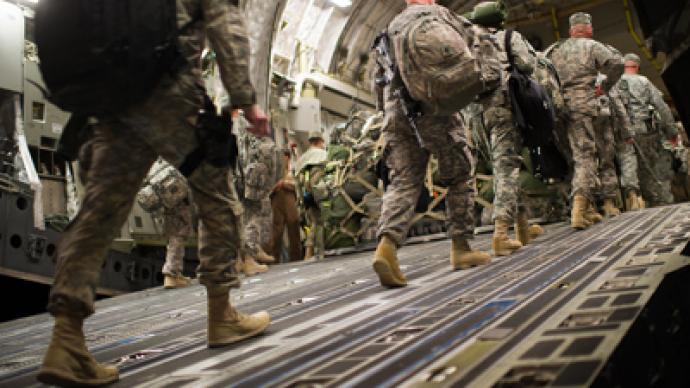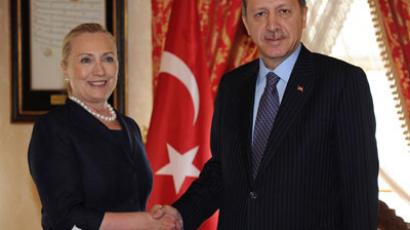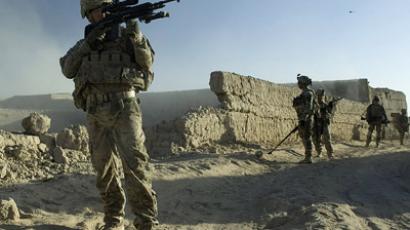Planes, strains and geopolitical spills: Syrian conflict goes global

The families of 17 Russian passengers on a Damascus-bound plane from Moscow got a midnight shock upon learning that Turkish jets had intercepted the flight. For those asking why, the answer begins in Syria, and ripples throughout the world.
Damascus called it an act of piracy. Ankara said it was exercising its rights. Moscow accused the Turkish government of endangering the lives of Russian nationals. That Turkish military jets would intercept a passenger plane en route from Moscow to Damascus shows just how much the 18-month conflict to topple the government of President Bashar al-Assad has rippled throughout the region and the world.Turkey’s increased belligerence, which began with a disproportionate retaliatory shelling campaign against Syria last week and culminated in the interception of the Syrian passenger plane under the pretext that it was carrying Russian military equipment, has sparked a diplomatic row for which Ankara initially had few answers.On Thursday Turkish Prime Minister Recep Tayyip Erdogan announced the plane was carrying munitions for the Syrian Defense Ministry.Russia's arms export agency said that it had no cargo on the flight, while military analysts argue it is unlikely Moscow would use a civilian airliner to send military cargo to Syria. What emboldened Turkey to force the jet to land is another matter.“Turkey isn’t doing it without an 'okay' from Washington. And it is frightening actually how aggressively they’re playing at this point, especially a couple of weeks before the [American] election,” Anti-war activist and journalist Don Debar told RT.Just hours before Turkey intercepted the Syrian passenger plane, Nile Bowie, an independent journalist working in the region, told RT that six days of Turkey’s retaliatory shelling against Syria had laid the groundwork for a broader military intervention.“We have to look at what the Turkish government has done recently. Recently lawmakers in Ankara have passed this carte blanche legislation that allows the Turkish government to conduct operations within Syrian territory, and I think this is an extremely dangerous turn of events,” he said.
Encircling Syria
That an incident so rife with international implications would occur on the same day US Secretary of Defense Leon Panetta confirmed that a 150-strong US task force had been dispatched to the Jordan-Syrian border to insure regional security is also ringing alarm bells.Panetta, speaking before a NATO defense ministers' get-together on Wednesday, noted that the American military personnel would primarily help Jordan deal with the wave of refugees streaming in from Syria, as well as help monitor Syria’s chemical-biological weapons sites to “determine how best to respond to any concerns in that area.”The task force is based just north of the Jordanian capital Amman, some 55km from the Syrian border.US and Jordanian officials were also said to have been engaged in talks to set up a humanitarian buffer zone within Syrian territory to be patrolled by American-backed forces from Jordan, The New York Times reported Wednesday. Although that plan has currently been shelved, Bowie said the establishment of such a zone has long been discussed as a means of enacting regime change in Syria.“Throughout the duration of the conflict in Syria, we’ve heard a lot of talk about the creation of humanitarian corridors or buffer zones around the Turkish border, and now we’re hearing reports about the same being established on the Jordanian border. So ostensibly that is what the American personnel are there in Jordan to do,” Bowie said.Bowie added that the establishment of a buffer zone is neither Jordanian nor Turkish policy, though their use and implementation were proposed earlier this year by US hawks.“The US think-tank – the Brookings Institute – in March 2012 published a report entitled ‘Assessing Regime Change Options in Syria,’ where they specifically cite the creation of a buffer zone or a humanitarian corridor as a means to base certain rebel groups in the region [and] to project force towards the Syrian government in an attempt to topple it. So that appears to be what is playing out at the moment,” he continued.Lew Rockwell, founder of the Ludwig von Mises Institute, told RT the deployment of US forces to the Jordanian-Syrian border as a means to bolster the former’s security was disingenuous at best.“Jordan has long been a satellite of the US. It’s not actually an ally, it’s a province of the US. So why is the US putting in these troops? First of all, to imply that Syria is somehow threatening Jordan, which of course is not true. Syria has got their hands full with the US-inspired rebels who were trained, by the way, in Turkey at a US Air Force base several years before this started,” he said.Both analysts argue that a broader regional conflagration may be imminent. That this broader conflict would implicate Russia is unlikely a coincidence, as Moscow’s decision to block three separate UN resolutions on Syria has obviously put them at odds with thwarted Western interests.
Making Russia the villain
Russia’s UN envoy Vitaly Churkin asserted that the Western-backed resolutions were biased, would have provided the US and its allies every pretext to initiate regime change in Syria, and further, fanned the flames of extremists and terrorist groups.With much of the greater Middle East affected by war or civil unrest, the attempt to plunge yet another nation-state into a post-revolutionary security vacuum has done little to deter hawks itching for intervention.Wednesday’s interception “is precisely the type of incident that can stoke the tensions that the United States and their allies have been wanting in order to have some kind of an intervention in Syria,” analyst Eric Draitser told RT. “To demonize Russia is to lend credence to the side that is in favor of intervention,” he said. The West has gone to great lengths to “portray Russia as a villain” siding up with the “butcher" Assad, he continued.For the United States it is “impossible to sell” a war against Syria to the American public – unless the forces that stand in opposition to these plans, such as Russia, are totally demonized.Following the third Russia-China veto in the UN Security Council in July, Ambassador Churkin said “it's all about Iran." Saying that "unexpected changes brought about by the [2003 US] invasion of Iraq” had the unintended consequence of bolstering Iran, Syria had become a pawn in a geopolitical recalibration."There is no serious person I've talked to that doubts that a major geopolitical battle is being fought in Syria – and the people of Syria have no interest in that," Churkin continued.
You break it, you fix it
That Russia and China would both veto resolutions on Syria is no surprise, as the road to Damascus not only leads to Tehran, but Beijing as well.“Whether it’s the overthrow of Saddam Hussein or the intended overthrow … of Iran, the horrors that are going on in Syria now, this is all part of a plan to control the entire region; bring it under US hegemony and deny oil to China. That’s one of the reasons for the attack on Libya, because that oil was going to China and they don’t want oil going to China without the US being in control of it. This is just part of the empire,” Rockwell said.The consequence of the Western drive to effect regime change in Damascus, pushing the US and its allies to end up in bed with al-Qaeda is, unfortunately, well-tread ground.“The West and NATO countries have been blocked from overtly conducting regime change as a result of the veto by Russia and China in the UN Security Council. So they’ve put all their eggs in this basket of al-Qaeda, these other terrorist groups which they hope will target and topple the Syrian government,” Rockwell continued.The protracted military campaigns in Afghanistan and Iraq did little to remind Washington of the Weinberger Doctrine, though it did remind them that airstrikes and proxy fighters were politically easier for a war-weary populace to digest.Keeping US boots off the ground in Libya did not shield America from the inevitable blowback, however, as the recent death of American Ambassador John Christopher Stevens in Benghazi – the heart of the Libyan uprising – attests.Bowie concluded that, “if Washington continues to pursue this kind of policy – which can only be described as pathological – they ought to give a heads up to the next US ambassador to Syria, and tell him not to visit.”














